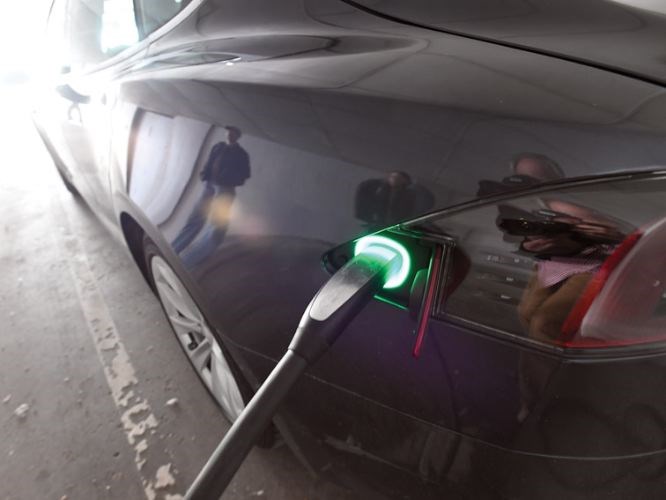The Northern Development Initiative Trust is partnering with 23 regional districts, municipalities and First Nations to install Level 2 electric vehicle charging stations in 26 locations across northern and central B.C.
Northern Develop announced $192,000 in funding for Charge North initiative, which will help fund a total of 47 public charging stations – including 11 in Prince George. The Regional District of Fraser-Fort George submitted the application for the funding and is working with the other local governments on the project.
"Six regional districts from Kamloops to Haida Gwaii decided to work together to plan an EV charging network," district vice-chair Lara Beckett said. "For most people have an EV, it will be a nice addition. But most people who have EVs have charging stations at home, and that's usually sufficient for day to day. I think the bigger thing is for people travelling, and promoting tourism."
Beckett has been driving an electric vehicle since 2006 – first a custom converted truck, then a Nissan Leaf. She said her family uses its vehicle to drive from the regional district to downtown Prince George – 25 km each way – and has never had an issue. However, the ability to top up the battery at a public station on cold day offers a little extra assurance, she said.
In May 2019 an information sheet released by B.C. Hydro estimated a Prince George resident living in College Heights and commuting downtown each day would spend $77 per year in additional electricity consumption driving a Nissan Leaf EV, compared to $340 per year in gas for a Honda Civic sedan, $389 per year for a Toyota RAV4 SUV or $583 per year for a Ford F-150 pickup truck. For residents living in the Hart or further out, the savings for driving an EV were even higher (see https://bit.ly/2usAexc).
The 47 planned stations will primarily be located in tourist and visitor-friendly areas, to provide extra charging options for residents and tourists, she said. What the plan isn't attempting to do is offer the high-speed Level 3 chargers.
Level 2 charges use 240V circuits – similar to household plugs for electric stoves and clothes dryers – and can take up to eight hours to fully charge a typical EV.
Level 3 chargers can charge many EVs from empty to 80 per cent full in 30 to 40 minutes, but require specialized high-capacity power infrastructure.
"For people who want to get from here to there, Level 3 chargers are the way to go," Beckett said. "(But) the Level 3s are very expensive. For any municipality or regional district, it would be very difficult to afford."
In 2018, B.C. Hydro and the provincial Ministry of Transportation committed to expand its network of Level 3 charging stations from Kamloops up to Prince George, then west to Prince Rupert.
The B.C. Hydro network along Highway 5 from Valemount down to Kamloops – including a station in McBride on Highway 16 – is already operational, and Level 3 stations in Hixon, Quesnel and Williams Lake are expected to be operational next week, BC Hydro spokesman Bob Gammer said. A planned BC Hydro Level 3 station in Prince George is expected to be complete this spring, however a private Level 3 charging station is available at Hub City Volkswagen.
"The plan is to build (the charging station network) west to Haida Gwaii this year, subject to funding," Gammer added.
Beckett said the network planned by the local communities is intended to supplement the B.C. Hydro network, not duplicate it.
The funding from Northern Development will cover some of the costs, and each municipality has committed between $2,500 to $5,000 per station for the capital costs. The Northern Development funds are dependent on other grant applications, and many of the specific details still need to be worked out, she said.
"Even if all the money was approved tomorrow, it would still be some time before they are all built."
The Community Energy Association has been tapped to administrate the plan, based on the group's experience developing a similar plan in the Kootenays.
"The number of British Columbians switching to electric vehicles is growing exponentially. There are over 20,000 new EVs on B.C.'s roads, with more diverse models coming to the market," Community Energy Association senior manager Janice Keyes said in a press release. "This project recognizes that growth and the potential it provides."
Northern Development CEO Joel McKay said the funding isn't a "one and done" project.
"As the number of EVs increase, so does the need for charging stations and I look forward to committing more grant dollars in the future," McKay said.
A full list of the proposed charging station locations can be found online here: https://bit.ly/2QYx102.



